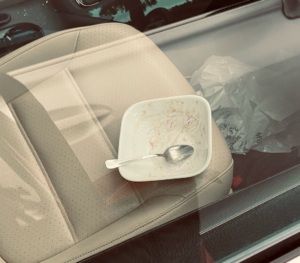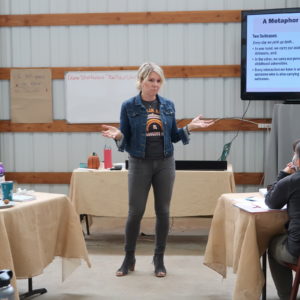
Friends,
I was running into a clinic a few weeks ago and glanced into the passenger seat of the car next to me. This is what I saw – a bit of trash on the floor, some wrappers, and garbage of a busy driver. Something haphazardly strewn in a moment of rushing. And I saw an empty bowl with a spoon on the seat – some type of yogurt, the creamy residue was left in the bowl after a busy breakfast on the way to work. And here was my immediate thought: Whose bowl is this? Was she rushing into work after scarfing down a parfait in traffic? Was he getting his teen to eat just a bit before school while dashing into clinic? Was this a lunch break in someone’s car as the only respite from patients? Was the bowl from this morning or days ago, now forgotten?
This is my bowl.
This is your bowl.
It’s all too busy right now. It’s rushed and chaotic and we are being asked to solve problems that are brand new to us or that we have limited resources to solve. We are rushing into work, out of work, cramming in an endless task of to-do’s during an unprecedented time of continual barriers. We are having to justify our opinion and expertise. And we are supposed to balance our work with self-care, family care, partner care, aging parent care, child care, and the like.
Can you stop and feel this for a moment?
One of the largest contributors to burnout is emotional exhaustion. And the only cure for emotional exhaustion? Feel the feelings. Yep. Sorry if that’s not you; but we must begin. And if you can’t begin for you, can you feel it for this person? The person with the forgotten bowl?
I had SO much empathy for him or her. I had tears in my eyes and no judgment in my heart. Probably because it hit so close to home. What had I rushed through that day? A meal? A hug? A sweet text? My shower? Saying goodbye to my kids before school?
We must begin to feel our feelings. I know it’s scary to many of you. I know some of you are thinking, “If I feel my feelings, I’ll never come out of it.” But the truth is that the sooner we acknowledge the pain, it dissipates; and the more we ignore pain, the bigger it grows. Think of emotional pain like an incessant toddler knocking on the door for attention. Or the dinging that happens in your car until you put on your seat belt. It demands to be heard.
Once we acknowledge emotional pain and overwhelm, then we can begin to address it. So, that’s the first step. Saying, “this is too much for me right now” or “I’m lonely in this pain and unsure what to do” or noticing someone else’s overwhelm and saying, “me too.”
Send me a picture of your passenger seat – I embrace all of your mess!
Once we tackle step one, we’ll move on to step two. Messy bowls, for now, my friends.
With compassion,
Dr. Amy



